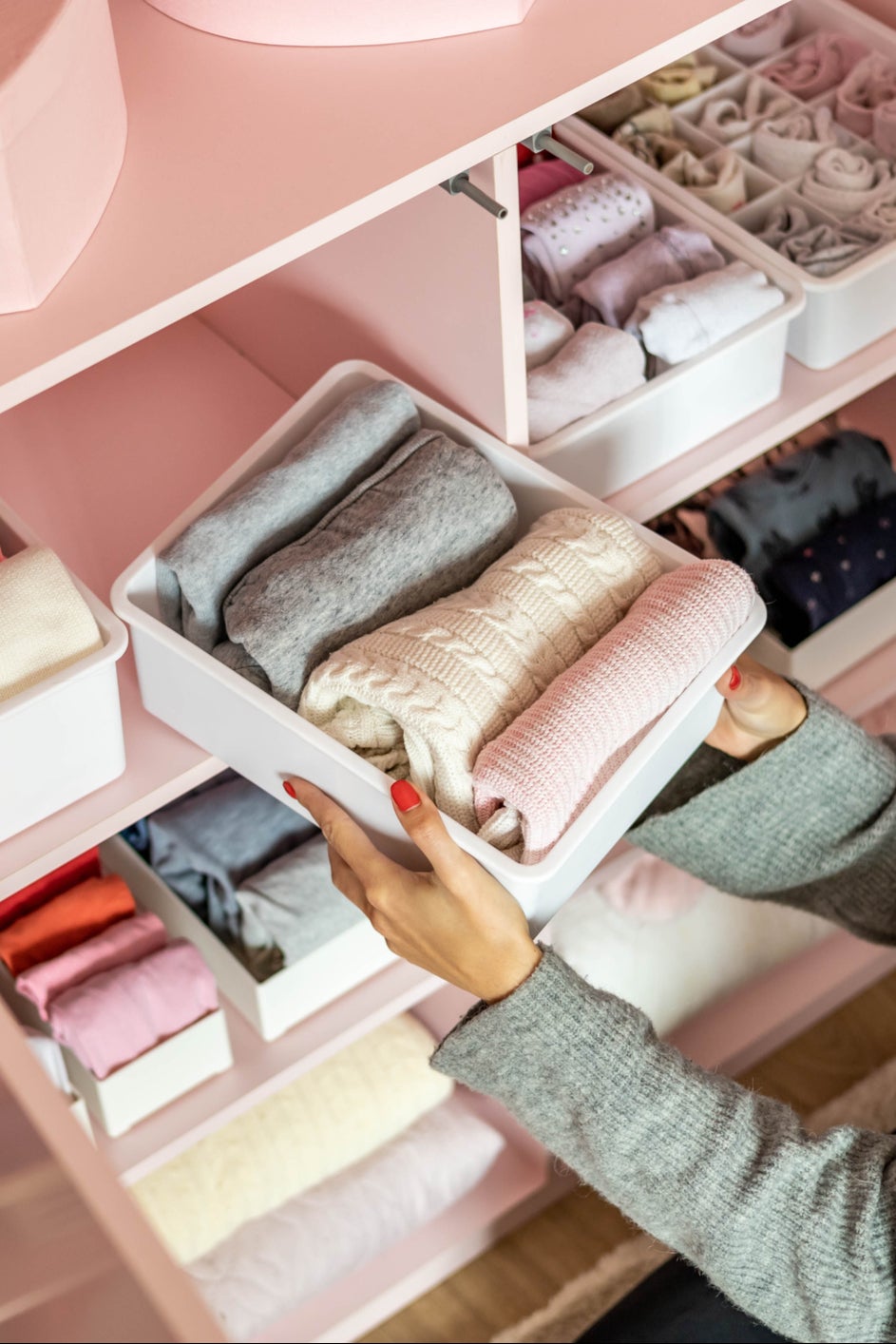[ad_1]
I am chronically disorganised. I always have been. When I was a child, it was semi-endearing; when I was at university, it mattered little given that the constant takeaway boxes and piles of clothes from my other housemates were also strewn across our living space. When I first moved out, I lived alone so there was no one else there to be impacted by my disorganisation but me. Now in my thirties, though, I live with my husband and daughter and my mess-making has been the cause of the bulk of our arguments.
And we’re not alone in our decluttering desolation. According to recent research by Olio, one in six adults has considered breaking up with someone because of how messy they are. A study across 2,000 adults in a relationship, revealed 47 per cent argue on a weekly basis about clutter in their home – with 23 per cent admitting their partner’s approach to tidiness has put a strain on their relationship. My husband would count himself in both those statistics. I know I need to change my ways, the question is how?
Luckily, we’re living in the age of the professional organiser – experts at creating systems for keeping a space tidy and organised, and adept at helping even the hardiest of hoarders declutter. Many are amassing tens of thousands of followers on Instagram and racking up millions of views on TikTok, too. From organisational award-winner Lucy Mancey and her almost 40,000 followers, to Charlotte Silver, known as @organisedbycharlotte on Instagram, who keeps her 21,000 followers entertained with before-and-afters from her clients’ pantries, kitchens, bathrooms and wardrobes.
Nancy and Susannah, the duo behind Ever So Organised, are fully paid-up members of the Association of Professional Declutterers & Organisers (APDO), a group that trains and certifies professional organisers, and hosts yearly conferences. They’re also the go-to organisers for celebrities and plain old disorganised members of the public alike, and so when a mutual friend put us in touch, I knew they were the people to help me try to turn over a new leaf. “Don’t tidy a thing,” Nancy WhatsApped me ahead of their visit. “We need your house in its truest form.”
I have to admit, though, when the doorbell rang on the rainy Saturday we’d agreed upon, the piles of my toddler’s toys and bundles of clothes that peppered my home suddenly seemed more vulnerable than I’d anticipated. I wish I’d tidied just a little bit, I thought to myself.
If they were shocked by the state of our house on their arrival, they didn’t let on. Instead, we sat around the kitchen table and chatted about how my messy habits were impacting our life and our relationship. “I know it makes [my husband] feel devalued when he tidies the house and finds it’s messy again just a few hours later,” I confessed. “But I do value him, I just struggle to put systems in place myself and find it hard to know where to get started.”
‘How does it make you feel when you look at them?’ Nancy asked. ‘Sad,’ I said quietly, before adding: ‘It means that I perpetually miss a version of me that no longer exists.’
“I used to not mind doing all the tidying and organising in the house,” added my husband. “But I don’t think you really even care if it’s organised, so I don’t bother as much anymore.”
But I do care. I have moments where I feel compelled to rush around in a “quick spruce-up” ahead of a friend coming over, and I enjoy it when the house is tidy, with a big bunch of flowers on the kitchen table and those neat vacuuming marks on the rugs. I just struggle to actually do it.
Therapy session somewhat over (“It’s often a bit like therapy for most people, because our homes hold so much emotion for us,” Nancy and Susannah assured me), we left our now-cold teas on the table (though I did make a note to put them in the dishwasher later) and got started.
“The first thing you have to do in order to change the space is to change your habits,” they advised. “A hard edit of all of the possessions currently within that area. We often find that people will have stuff in cupboards that they haven’t actually got out for three or four years. If it’s not sentimental and you haven’t used it, do you need to keep it?”
They explained that every area of a house should have a purpose – even if that means putting a simple vase of flowers there – otherwise, it could become a dumping ground for excess. “Clutter attracts more clutter,” they said. And just cut down on possessions if you can: “Avoid the trap that people fall into when they decide to organise, to go and buy storage solutions before they have edited their possessions. Often this means that people end up with storage solutions not fit for purpose and that aren’t the right fit.”

And they even suggested getting my 15-month-old involved. “Teach her to tidy as part of her daily routine,” they told us, recommending that we put on the “Tidy Up Song” (which, as it turns out, is a pretty catchy number) and see how much we can put away together to during that time, to make it a fun activity together. We’ve started doing this daily and I am continuously surprised at the sense of peace from knowing that I’m helping my daughter cultivate healthy home habits and hopefully helping steer her away from the stress and arguments being a chronic mess-maker can cause.
But it was while in our bedroom with Nancy and Susannah that the penny really dropped for me. At the top of the house, my wardrobe was stuffed with clothes that spanned no less than five dress sizes. “How does it make you feel when you look at them?” Nancy asked. “Sad,” I said quietly, before adding: “It means that I perpetually miss a version of me that no longer exists.”
And that question, one I hadn’t anticipated being asked, felt like the closest thing to an awakening I’d ever had when it came to accumulating clutter. I’d assumed it made me feel safe, that it meant I was holding onto memories, creating a buffer of items that might be useful again one day. In fact, it made me feel sad and overwhelmed.
Although hanging onto things I can no longer wear isn’t just a “me thing”, national statistics show that the average person wears less than 30 per cent of their wardrobe. “We hold onto our wardrobe’s contents for many reasons that are often but not limited to guilt over expensive purchases, body dysmorphia or a desire to lose weight and fit into them again,” Nancy explained. “Find a local charity you care about and that means something important to you. Often knowing that your belongings will be going to a place you care about can help you let go of items that no longer serve a purpose to you.”
So that’s what I did. I’m no longer the owner of a limited edition Ganni T-shirt collection, but I am the owner of a much more spacious wardrobe, that doesn’t feel overwhelming to keep in shape. Do items still end up on the floor? Yes, they do. But they move back onto their designated hanger much faster.

“Do you think this is it then?” my husband asked me a few days later. “Do you think you’re a changed woman?” I didn’t have an answer for him at the time (though I was enjoying our calmer living space more than I cared to admit), but I do have one now, having had a little longer to think about it.
No, I don’t think I’m a changed woman. I think I’m the same woman; the same woman who can’t always tidy up as she goes along, can’t create a comprehensive storage system herself and doesn’t always notice the trail of mess that’s being left behind her. What has changed, though, is that I now have strategies, ones that I know work, because they come from the experts. Knowing the belief the professionals hold that a few small tweaks can be the catalyst for big change is exactly the kind of motivation I needed.
The butterfly effect theory suggests that small changes can lead to significant outcomes. In the context of decluttering, this principle becomes almost poetic. A well-organised wardrobe may seem like a trivial improvement, but in practice it can profoundly reduce daily stress, save time, and even improve mental clarity. With everything in its place – coats neatly hung, spices easily accessible – there’s less fumbling, less frustration. The cumulative effect is a quieter, smoother day-to-day existence. And I’m all in for that.
[ad_2]
READ SOURCE















